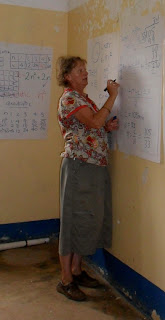“I don't know if you know it but we have this festival in Denmark, I think it’s called Easter!"
No-one could speak for laughing for about 5 minutes.
Sign of the week
More on traffic/roads/vehicle in Tanzania
If you see a pile of greenery (branches pulled off the closest tree) on the road you know there is (or was) a truck or bus broken down just around the corner. If there is a rock just past the greenery then the truck or bus has gone but the chock that stopped it rolling away while it was being fixed is still there to add to the exhilarating experience that is driving in Tanzania.
Sometimes, if the truck or bus is still there, there will also be a safety traffic triangle among the greenery. It is compulsory to carry two at all times when your car/truck/bus is on the road as well as a road safety sticker on your windscreen and a fire extinguisher.
We carry two extra safety triangles. I was cautioned by a policeman several months ago because one of my triangles was missing half a side of reflective red plastic. He said it was a ‘pembe-mbili-na-nusu’ (2½ sided figure) and not the pembetatu (3 sided) required! He said he would ‘punish’ me if I didn’t have two complete ones next time! I fixed the broken one but bought two new ones anyway. I didn’t like the look he gave me when he said he would have to punish me.
Today we drove to Katoke to visit the maths lecturer at the Teacher Training College there. We drove along a road that has become worse as the wet season has progressed as the heavy rain washes away the clay and leaves the sharp rock exposed. Buses use the road and their undersides are scraped on the rock as the 27 passengers (in a vehicle the size of a Ford Spectron) get tossed around inside.
We approached a tight corner and there was a pile of greenery on the road. We continued cautiously and around the corner there was a small truck on a big angle with wheels on one side off the road and in a ditch. It looked like it had tried to avoid the bigger truck which was coming the other way on the wrong side of the road trying to avoid the rocks. The trucks had collided and neither was able to move. No-one was hurt but people were milling around and clambouring over the vehicles trying to work out how to extricate the trucks from the tangle they were in. The millers-around had probably been ‘passengers’ sitting on the loads on the backs of the trucks!
Luckily the road was wide enough for us to safely go by and we had been cautious enough to be going at a safe speed so we had no problems. Our cautious style of driving though is very un-Tanzanian!
Tanzanians are very patient people, they are never in a rush, unless they are behind the wheel of a car or sitting on a motor bike. Then there seems to be nothing more important than getting to the next corner or the next town at the fastest speed possible with no thought to safety or the convenience of other drivers.
Steve has plans to hire a truck with loud speakers (a la election time) and drive around town blasting out Miles Davis and road safety messages – ‘drivers slow down’, ‘pedestrians walk towards on coming traffic’, ‘turn on your headlights’, ‘always wear a motorbike helmet’ and ‘don’t send text messages while riding your push bike on a busy road’ Seriously, he could save many lives!

























